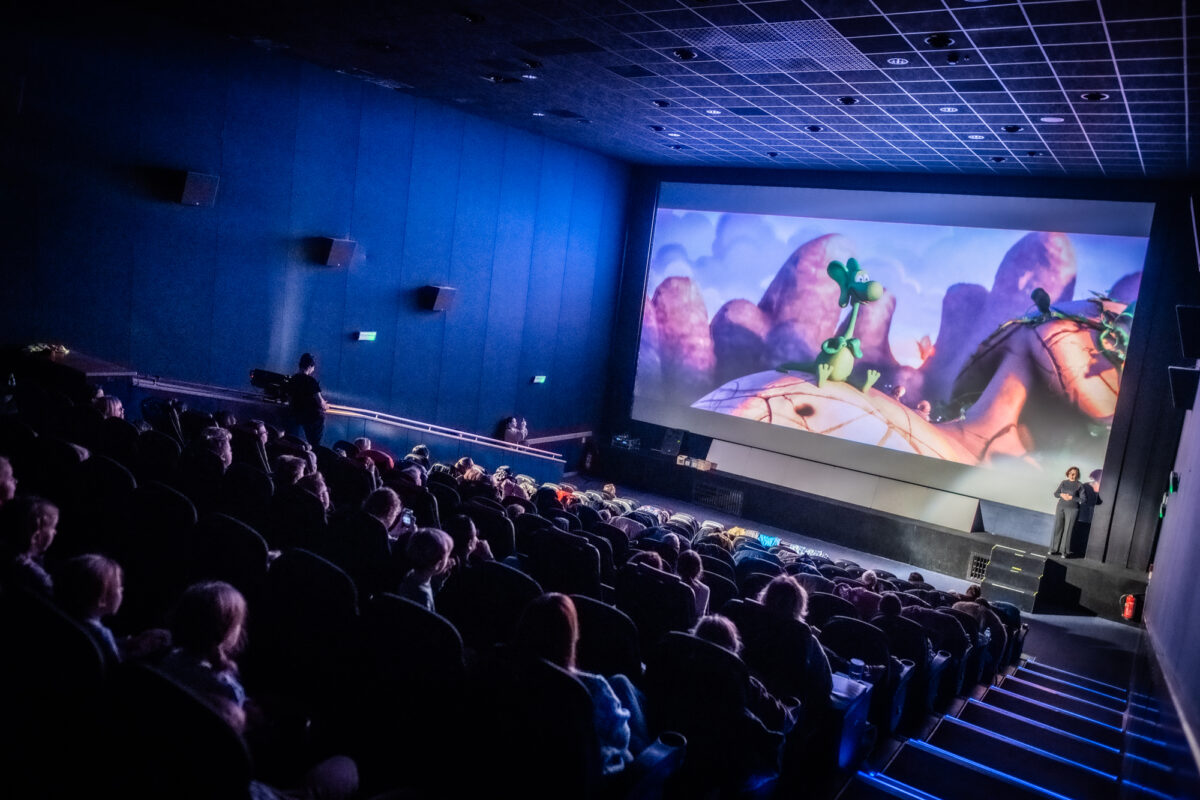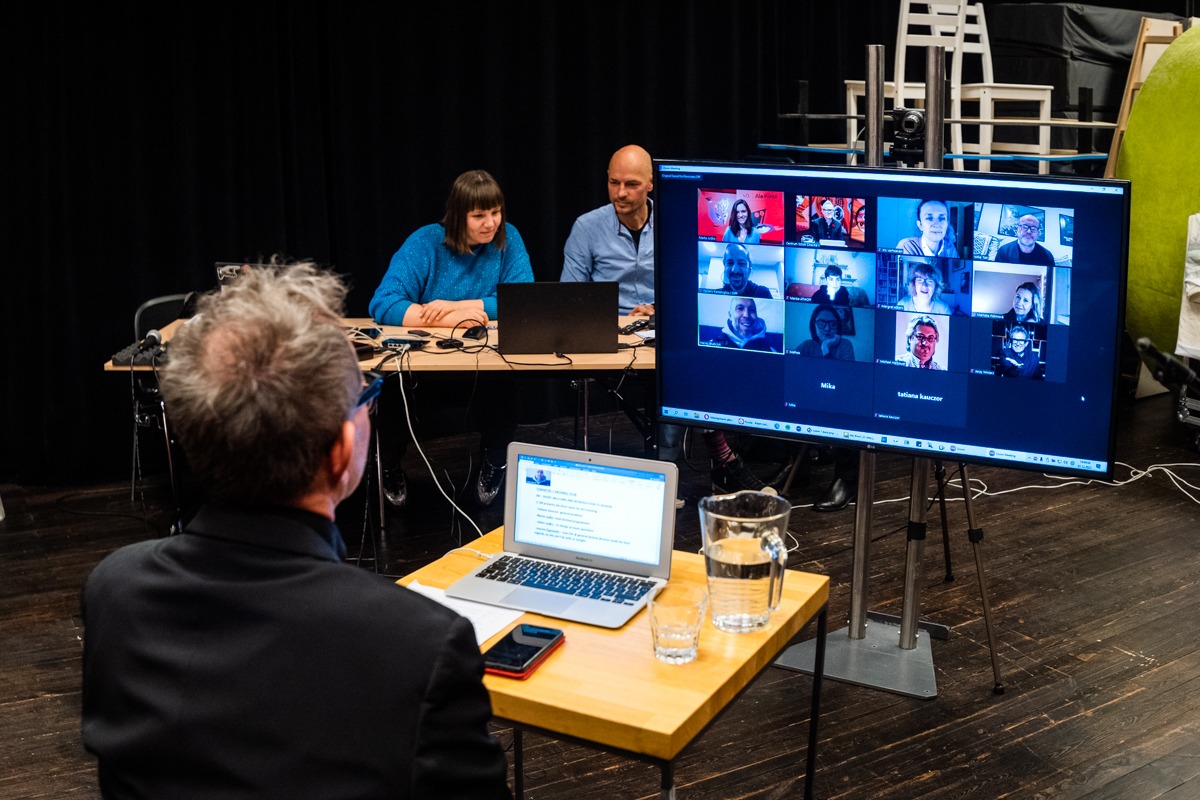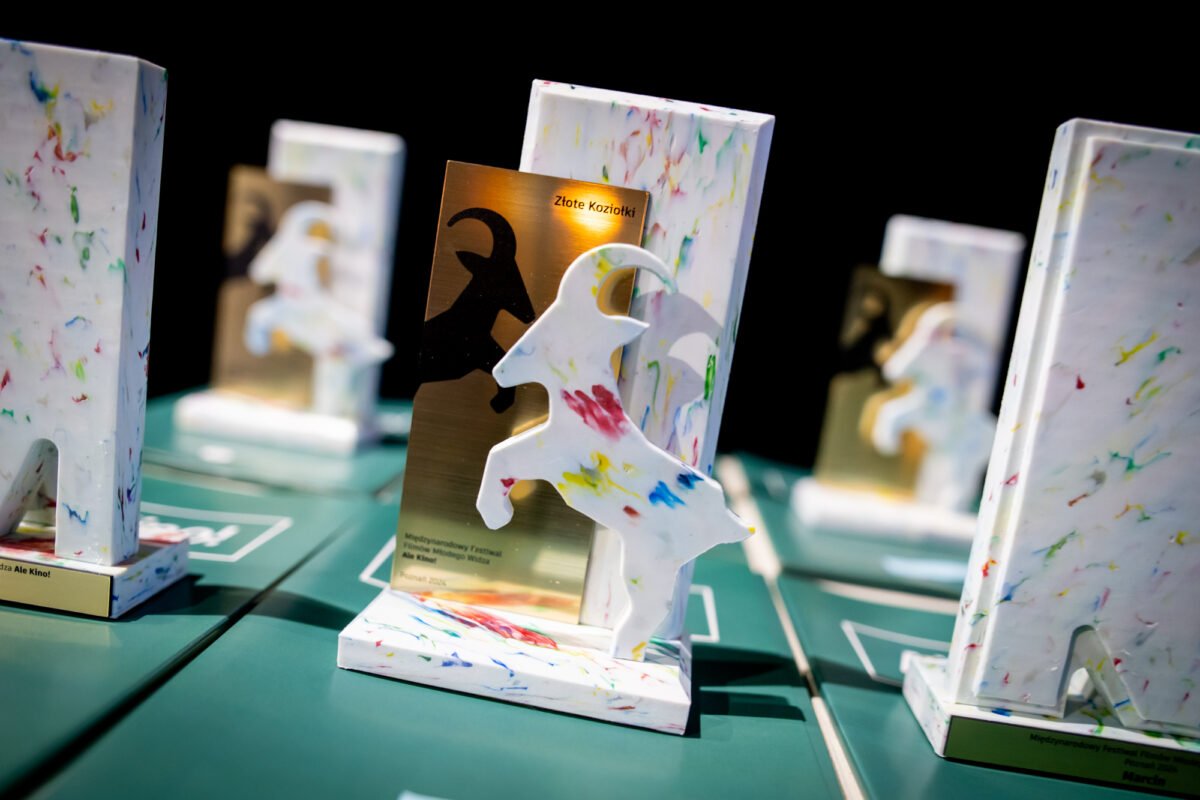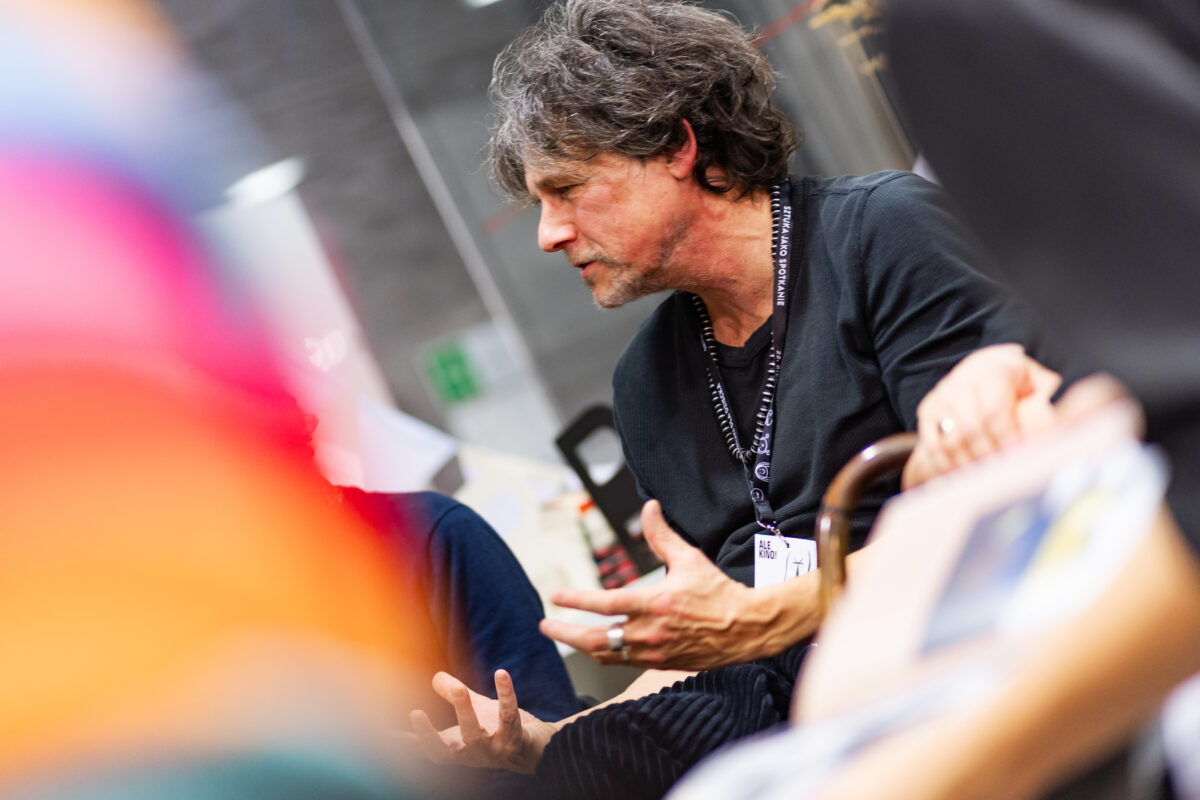
Submit a film to the Ale Kino Festival!
We have started recruiting films for the 43rd edition of Ale Kino!
European children & youth film festivals in the post pandemic year – an online exchange organised by the Ale Kino! Festival.

photo: Maciej Zakrzewski
In 2020 the AleKino! Festival launched a tradition: a yearly online meeting in which festivals exchange experiences and tackle challenges that are inextricably linked to the pandemic situation. This year’s edition went under the title “Back to the cinemas – European children & youth film festivals in the post pandemic year”. All participating festivals expressed their happiness about films and audiences returning to the cinemas.
Participants were welcomed by AleKino! coordinator Jerzy Moszkowicz: “After two years of lockdowns and hybrid or online events, 2022 was the year of our big comeback to the cinemas. But went everything back as usual, like before the pandemic? Could we erase those two years from our minds and act as if nothing had happened?”
Against the backdrop of new problems, like the war in Ukraine and the economic crisis, Jerzy Moszkowicz spoke about the importance of quality cinema for children, conveying a message of sympathy, compassion, friendship, and love to the widest possible audience. “One way to achieve this goal is to meet together and exchange our knowledge.” This happened under the auspices of ECFA.
Representatives from 11 European festivals each had four minutes to answer these questions:
1. Did the audience return to the cinemas? Was the festival held just like in pre-pandemic times?
2. How have the pandemic years affected the organisation of your festival?
3. Was your festival held only in cinemas or did you go hybrid? And why?
4. Additional question: what are the perspectives for 2023?
JEF festival – Iris Verhoeven (February)
We survived! The entire event was prepared under “code red”, following a set of strict restrictions. During the festival that code changed, which made communication with the audience rather difficult.
People didn’t come to the cinemas the same way they did before. We found an audience for special events(inflatable cinema, MediaLab,…), but not for regular screenings.
In 2021 a hybrid festival felt like the way to reach out to our audience. In 2022 the eagerness seemed to have gonealready. That is why our upcoming edition will be held “strictly physical”, in the cinemas.
Kristiansand Int’l Children’s Film Festival – Mathea Roland (April)
The festival was held pretty much the same way as in pre-pandemic times, but the audience didn’t come back the same way, which is something all Norwegian cultural institutions are struggling with, including the cinema in Kristiansand.
The pandemic was mainly felt in the preparation phase. Once the permission from the government came to go “live”, we completely forgot about our hybrid plans, which made things quite hectic. In 2023 we would like to pick up again with some online screenings.
Zlin Film Festival – Marketa Pasmova (May – June)
The audience – especially schools – returned. We planned 10% fewer screenings than before the pandemic but actually demand exceeded supply. We never lost contact with our audience as every edition was held physically, one way or another.
The audience returned, but not the sponsors, which makes our financial situation rather precarious. The future isn’t looking bright, which goes for the entire Czech cinema industry (national box office: 18 million viewers in 2019, 13 million viewers in 2022).
Within the organisation, the pandemic brought us positive things like: a quick acceptance of changes and challenges, especially in the online environment (like building a VOD platform, which we use year round for didactic material for schools).
Kids Kino Festival – Maciej Jakubczyk (September)
At Kids Kino and New Horizons we feel that we made the best edition ever, and statistics are there to prove it. More than by the consequences of the pandemic, tensions in the team were caused by the many changes in our staff. But with the new team, we made it happen.
The hybrid combination of online and cinema audiences resulted in a double number of viewers. The cinemas came back strongly, with the best score ever. The online part took a slow start, which might be a sign that people are a bit fed up with online events.
In the future we would love to include workshops, interviews,… in the online environment. We had a vivid industry part of the festival with more than 200 live guests and another 100 online. This is another hybrid dimension that we want to maintain.
Significant: for the first time we had enough Polish films to organise a separate competition. What a great change compared to the years when we started our festival!
Jerzy Moszkowicz thanks Kids Kino for their efforts in boosting the domestic industry!
AleKino! Festival – Marta Jodko (October)
Returning to the cinemas after 3 years and 2 strictly online editions, we needed to change dates, which made us lose some of our family audiences, but schools returned eagerly.
During the festival preparation, we were focused on the offline edition, but always kept in mind our options to move back online. One of the reasons to remain hybrid (cinemas in October, short films online in December) was not to lose our newfound school audience outside our own region. On the level of programming, we kept in mind not only the consequences of the pandemic years, but also the war going on in a neighbouring country, which makes people feel vulnerable and confused. We were more careful than usual on the level of content & form.
Organising a festival has always been a stressful experience, but these days it seems even more demanding. To me personally, it feels like a difficult moment for festivals.
Note: in 2023 the AleKino! Festival will return in December.
Jerzy Moszkowicz adds a personal note about facing the crowd in the opening ceremony: “These 2 years were an important experience… but I wouldn’t like to go back to it.
Schlingel festival – Michael Harbauer (October)
Our return to the cinemas had certain consequences:
– we had less visitors (20,000) than before the pandemic (25,000), but more than during the pandemic.
– we maintained some recent features from the pandemic years, like keeping visitors separated per age group. The audience liked the concept so we hired extra venues.
– the most successful elements from pre-pandemic years still seem to work nowadays, for instance asking schools to dedicate a full day to cinema.
Even with a partly new team, we succeeded in hosting approx. 200 professionals!
In 2023 our festival dates will shift to the end of September (due to the school holidays). This will require some extra efforts from the team.
Cinekid – Heleen Rouw (October)
My first “real edition” was a good one! Many good things returned: the industry, the audience (number of admissions like in 2019), the schools, the MediaLab,… We had our own location, and I’m specifically proud about taking our social responsibility through offering reduced prices for visitors with less financial capacities.
One highlight to mention: the Inflatable Cinema, coming from Portugal, was really great, lowering the threshold for short films to find an audience. We would love to have it again, but the current formula is not sustainable. Why don’t we set up a European tour?
My main concern at the moment is how to bring youth films and coming-of-age drama to the cinemas. How to sell a great film like COMEDY QUEEN in a festival mainly targeting a 9-year-old audience?
Discovery Film Festival – Mike Tait (October – November)
Our festival is working closely with schools. This year was a test case: ‘will the schools be willing to come back?’ Some of them did, but not all. We had about 40% of the audience compared to pre-pandemic years, but we’re heading back in the right direction.
Remarkable: schools were not so much worried about health issues but about the cost of living (cinema transport). Our festival is primarily funded by ticket sales but for public screenings we tried for the first time a “pay what you can” concept, which worked well.
Positive tendencies:
– Just like last year, we didn’t schedule the films – I programmed a selection covering all ages, we put the information out to the schools and asked them which film they liked to see.
– Since we have the space, we asked schools ‘if you come to see the film, why not stay for a workshop or a visit to our art gallery?’ The tradition of pre- and post-screening activities has always taken place in the schools, while this year we hosted many more groups inside the cinema. It was nice to have children engaged in the building as a whole. If going back to full capacity, this is an element I would like to keep.
This year we had much more difficulties negotiating rights to put feature films online; there was a hesitancy with sales and distributors that we didn’t experience last year.
Next year we’ll celebrate our 20th edition. For an anniversary edition, should we do more or should we celebrate what we do already? Do we try to go big and sparkly, or is what we’re producing every year good enough? There will be a 20th edition, but what it will look like, I’m really not too sure at all yet.
Many participants experienced similar problems with feature films for online screenings. Distributors had sky-high financial expectations.
Oulu Festival – Mika Anttolainen (November)
The last few years we held an offline festival, combined with an extra online programme. This year the audience returned, although some teachers still refused. Even when following a strict set of rules, still some team and jury members got sick during the festival.
Schools are really happy with the online offer we prepare for them, which saves them money for transport. That is why we will maintain this option next year.
Olympia Film Festival – Pantelis Panteloglou (December)
(The festival was in its preparation phase.)
We’ll have around 300 guests, including many foreign kids for Camera Zizanio. Reservations for school screenings reach up to 10,000 kids. Some of our activities (like workshops) seem to be less successful, which might have to do with word of mouth – we’ll have to build up that tradition again.
Our online platform, parallel to the festival, mainly addresses a national audience outside our region, an audience that we didn’t reach before, but we want to keep on serving them.
We are doing the same thing as before the pandemic; bringing the art of cinema to children. But we need to find ways to overcome the ticket prices in the cinemas, which goes hand in hand with broader problems.
Seeing the bigger picture, it might look rather bleak, but if you see how many people are active, trying to achieve things in every city and country, we should be optimistic about the future. To be successful, we need to be active, which means we can make mistakes.
Non-registered speakers:
Giffoni Film Festival – Antonia Grimaldi (July)
The difference with other festivals is: we don’t work with schools, but with families and other associations. But after this meeting, it seems we also have many things in common.
Things in common:
– Online screenings were not a big success – people want to go back to normal.
– Our private sponsors were already limited, but there were even less. We need to reorganise our economic situation.
– We’ll need another 2 or 3 years to return to the number of spectators we had before.
– Distributors had too high expectations regarding online screenings. With 180 features and shorts in our programme – those amounts were over the top.
Positive tendency:
– We could again host our young jury members – like we did before – with local families.
Athens Int’l Children’s Film Festival – Mariza Papadimitriou (December)
This was the best year in our young history! This year’s logline “As it was but not the same” was the best we could have had. The audience doubled – I guess we must have done some things better than we did them before?!
Some new elements in the organisation were:
– we had more post-screening activities running than before (like toddler cinema, workshops,,…). We even had to organise extra school screenings.
– we decided to open the pre-sales one month earlier.
– we organised the hybrid festival not simultaneously with physical screenings. Every 10 days the online programme was renewed, so we could cover a longer period of time.
Margret Albers (ECFA) sums it up:
Making this impressive journey through the year 2022, we came across some interesting loglines. Here is another one: Change is the new continuity. The cycle of changes has accelerated – each year we have to renew our formula, while all the time dealing with new teams, new crises, a lack of money,…
Once again the resilience of the children & youth film community was shown. We are used to being more active than others. Times will be difficult… but have they ever been easy for us?
We have reasons to remain optimistic. Sticking together is more important than ever. Even now the struggle for public money will increase, with a community like ours I’m optimistic that we will succeed and do great things in 2023.
Author: Gert Hermans

We have started recruiting films for the 43rd edition of Ale Kino!

